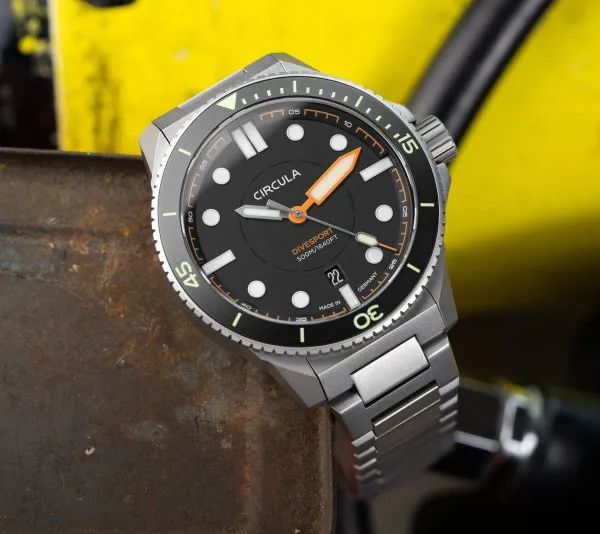Titanium watches
Advantages and disadvantages
Titanium watches are very popular alongside watches made of steel (such as 316L stainless steel). It is therefore not surprising that numerous watch manufacturers have diving watches or chronographs made of this material in their range. This article will therefore take a closer look at the advantages and disadvantages of titanium wristwatches. You will also find out what titanium actually is, what properties it has and how it is manufactured.
What is titanium?
Titanium is a chemical element that has the symbol Ti in the chemical periodic table and belongs to the transition metals. This group also includes chromium, silver, gold, iron, nickel, copper and zinc. With a density of 4.5 g/cm³, titanium just about belongs to the group of light metals (up to 5 g/cm³) and has the best strength-to-density ratio in this group. Titanium has a white-metallic sheen, is robust, biocompatible, non-magnetic, hard-wearing and resistant to temperature and corrosion. It is also very light, weighing around half as much as steel or nickel alloys of the same dimensions. These properties make titanium a very interesting material that is used in various industries such as aerospace, chemicals, medicine and, of course, in the jewelry and watchmaking industries.
History of titanium
In the 18th century, titanium was discovered twice within a few years: the first time in 1791 in the Menaccan Valley in Cornwall by the English clergyman and amateur chemist William Gregor in the mineral ilmenite (FeTiO3 - titanium iron). Gregor initially referred to the mineral as menaccanite. The second time titanium was discovered was in 1795 by the German chemist Heinrich Klaproth in the mineral rutile (TiO2 - titanium dioxide). Klaproth gave the new metal the name titanium. He was inspired by the Titans of Greek mythology - these were the first children of the gods Uranos (heaven) and Gaia (earth). In 1797, it was finally recognized that the two minerals were the same metal and although Klaproth discovered titanium later, its name prevailed.
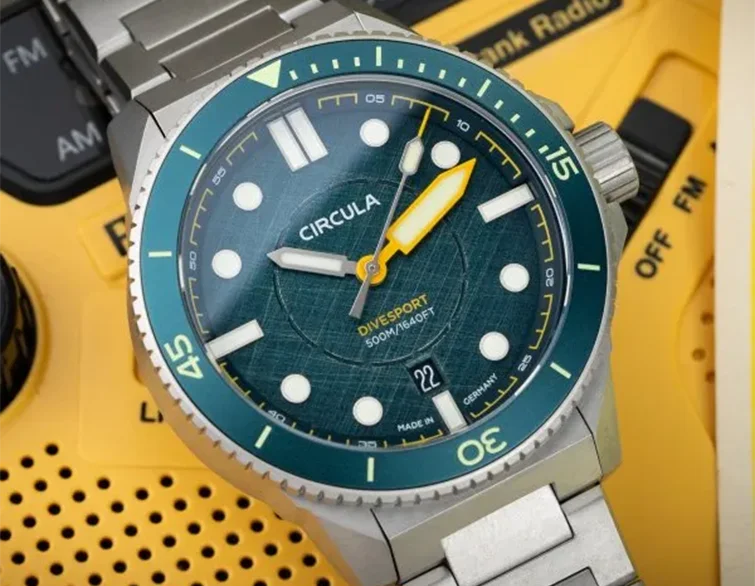
Production of titanium
Titanium is one of the 10 most common elements found in the earth's crust, but usually only in combination with oxygen. As pure titanium is rarely found in the earth, it has to be extracted from rutile (TiO2) or ilmenite (FeTiO3) using a complex, multi-step, cost- and energy-intensive process. Of the earth's minerals and ores, these two are particularly suitable for the production of metallic titanium. A total of around 140 minerals and ores are currently known to contain titanium. Titanium has also been found outside the planet Earth in meteorites and on the Earth's moon.
The complex manufacturing process and the difficult processing of the metal is the reason for the higher price compared to stainless steel. The manufacturing process usually takes place in two steps: First, titanium sponges are produced using the Kroll process and then these titanium sponges are remelted several times to produce pure titanium or titanium alloys, if small quantities of other chemical elements are also added to the titanium.
Titanium watches vs. stainless steel watches
Due to their material, titanium watches offer many advantages but also disadvantages compared to watches made of stainless steel. The following paragraphs will explain exactly what these are!
Advantages of titanium watches
The biggest advantages of titanium watches are that they are lightweight, corrosion-resistant and hypoallergenic. The material itself also looks very elegant, has a high-quality feel and is very robust. But let's take a closer look at the individual advantages of titanium over stainless steel:
Titanium watches are particularly light
With a density of 4.5 g/cm3, titanium (unlike stainless steel) belongs to the group of light metals and has the best strength-to-density ratio of all light metals. This means that titanium, for example, does not dent as easily as the light metal aluminum. For comparison: A piece of titanium weighs about half as much as a piece of 316L stainless steel of the same size (8 g/cm3). A piece of aluminum (approx. 2.7 g/cm3), on the other hand, is a good half as heavy as a piece of titanium of the same size. A watch with a titanium case is therefore significantly lighter and more comfortable to wear than a steel watch of the same size. Titanium models are ideal as sports watches due to their lower weight and greater wearing comfort.
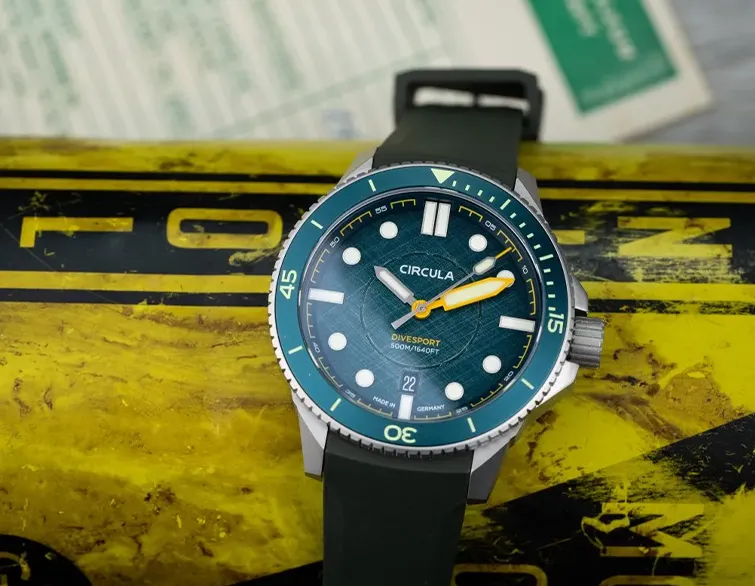
Titanium watches are corrosion-resistant and robust
Titanium is not only particularly light, but also resistant to chloride solutions, organic acids (e.g. contained in sweat) and seawater. Its corrosion resistance is roughly equivalent to that of V4A stainless steel. Watches with a titanium case and bracelet can therefore be worn in swimming pools, open-air swimming pools and the sea without hesitation (provided they are waterproof). Titanium cannot rust, as an oxide layer forms on the material as soon as it comes into contact with oxygen, which reliably protects it from corrosion.
Titanium watches are hypoallergenic
This oxide layer not only protects the titanium surface from corrosion, but this layer also means that the allergy potential is very low. Watches with titanium cases and bracelets are therefore particularly suitable for allergy sufferers.
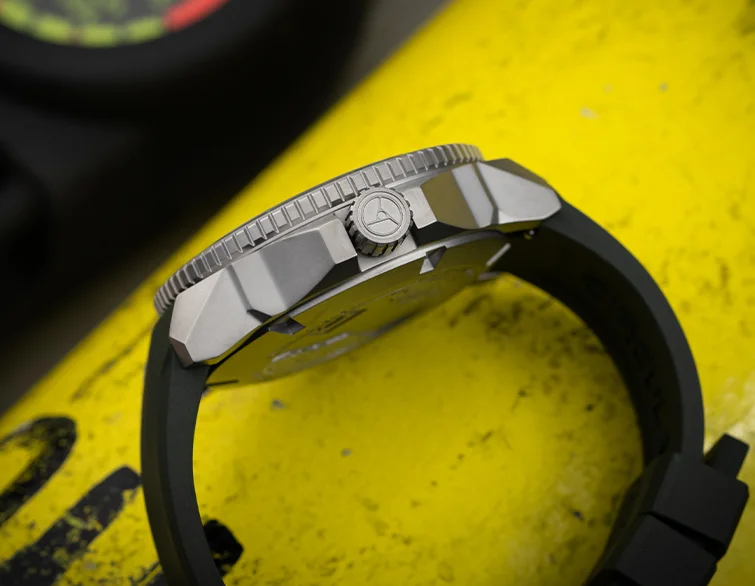
Watches made of titanium (alloys) are less susceptible to scratches than stainless steel models
The purer the titanium, the softer it is. Due to contact with oxygen and the resulting oxide layer, titanium is also somewhat more scratch-resistant than stainless steel. To make titanium even more resistant to scratches, a small amount of other metals (e.g. aluminum) can also be added to it. These so-called alloys then combine the good properties of both metals. A titanium alloy, for example, is harder than pure titanium.
Disadvantages of titanium watches
In addition to all these advantages, titanium watches also have a few disadvantages.
Titanium watches can also be scratched
Depending on the alloy or thanks to the oxide layer, titanium watches are harder than stainless steel watches, but not scratch-resistant. For this reason, some watch manufacturers additionally seal the surface of their watches to make them even more resistant.
Titanium watches are more expensive than stainless steel watches
The elaborate manufacturing process and the complicated processing of the material naturally has its price, which is why titanium watches are usually more expensive than comparable watches made of stainless steel. Nevertheless, titanium watches are still significantly cheaper than luxury watches made of gold or platinum.
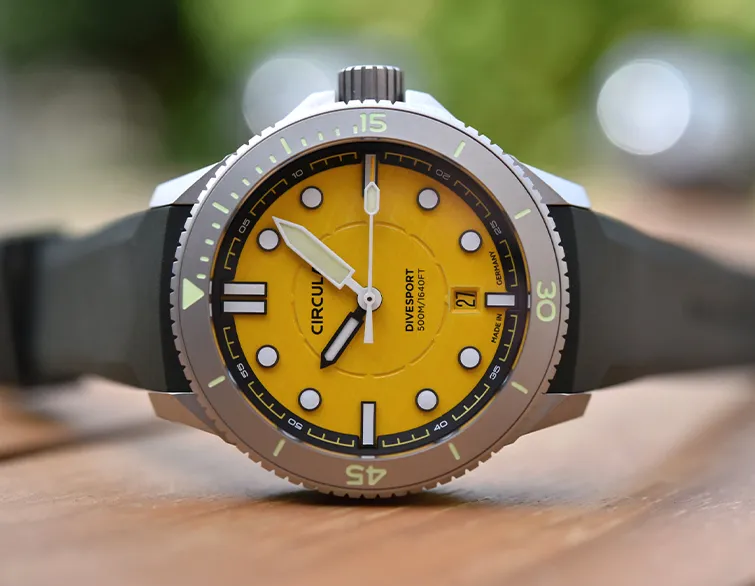
Titanium watches are not as variable as stainless steel watches
Unlike steel models, which can be matt or shiny depending on the finish, titanium watches naturally have a silver-grey, matt and relatively characteristic appearance, which means they are not as variable in terms of finishing (e.g. polishing or brushing) as stainless steel watches, for example.
Titanium watches are (too) light
What is an advantage for some is a disadvantage for others: some watch wearers find the low weight of a titanium watch on the wrist irritating, while others like the wearing comfort of lightweight watches.
The titanium diving watches from Circula
For more variety in our watch range, we at Circula have developed a 500m titanium dive watch, the DiveSport. The features of the titanium diver's watch from Circula are as follows:
- Case and back made of grade 2 titanium and scratch-resistant up to 1,200 Vickers thanks to surface hardening
- Dimensions: 42 mm diameter, 48.5 mm horn to horn, approx. 13 mm height and 20 mm strap lug
- Unidirectional rotating diver's bezel with 120 mm detent and Swiss Super-LumiNova® C3 X1
- Inlay made of titanium or aluminum (petrol-colored model)
- Rough textured dial (black & gray) or dial with scratch pattern (petrol & yellow)
- Hands and indexes are filled with Swiss Super-LumiNova®BGW9 & C3 X1
- 500 meter water resistant
- Screw-down crown
- Swiss movement with automatic winding, caliber Sellita SW200-1 Elaboré
- Integrated rubber strap with quick-change system and optionally also available with hardened titanium strap.
